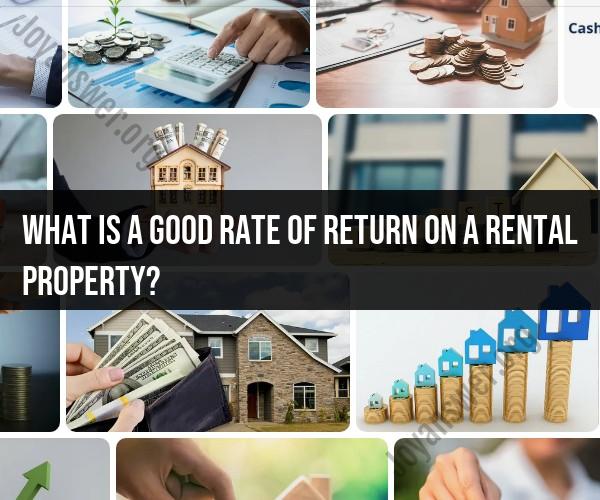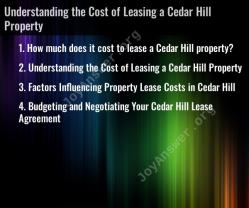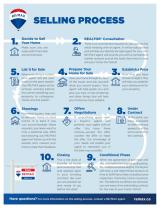What is a good rate of return on a rental property?
A good rate of return on a rental property can vary widely depending on several factors, including your location, investment goals, risk tolerance, and the type of property you're considering. What constitutes a desirable rate of return for one investor may not be the same for another. However, here are some general guidelines and considerations:
Cash Flow: Many real estate investors prioritize positive cash flow, which means the rental income exceeds the operating expenses and mortgage payments. A common benchmark is to aim for a 6% to 10% annual cash-on-cash return, which is the net income divided by the initial investment.
Cap Rate: The capitalization rate (cap rate) is another commonly used metric to assess a rental property's rate of return. It's calculated by dividing the property's net operating income (NOI) by its current market value or acquisition cost. Cap rates can vary by location and property type, but some investors target cap rates in the range of 4% to 10% or higher.
Total Return: In addition to cash flow and capitalization rate, investors consider the property's total return, which includes potential appreciation in property value over time. This can significantly impact the overall rate of return. A total annual return of 8% to 12% is often considered good for rental properties.
Market Conditions: Real estate market conditions play a vital role in determining what rate of return is achievable. In high-demand, appreciating markets, you may find lower cap rates but potential for higher long-term appreciation. In slower markets, you might find higher cap rates but less potential for rapid appreciation.
Risk Tolerance: Your willingness to take on risk should also factor into your rate of return expectations. Higher returns often come with higher risk. If you have a lower risk tolerance, you may be content with a more modest rate of return on a property that offers stability and lower risk.
Property Type: Different types of rental properties (e.g., residential, commercial, multifamily) can yield different rates of return. Commercial properties, for example, may offer higher returns but come with added complexity and risk.
Financing Terms: The terms of your financing, including interest rates and loan terms, can significantly affect your rate of return. Favorable financing terms can enhance your overall return.
Investment Horizon: Consider how long you plan to hold the property. Short-term investors may target higher returns for a quick profit, while long-term investors may prioritize stability and potential appreciation over time.
Local Regulations and Taxes: Local property regulations and tax laws can impact your overall return. Property taxes, income taxes, and potential changes in regulations should be factored into your analysis.
Comparative Analysis: Evaluate the rate of return in comparison to other investment opportunities, both in real estate and other asset classes. A desirable rate of return should be competitive with alternative investments.
There is no universally agreed-upon rate of return that qualifies as "good" for all rental properties. It ultimately depends on your individual investment strategy, financial goals, and risk tolerance. Conduct a thorough financial analysis, including cash flow projections and potential for property appreciation, and consult with financial advisors or real estate professionals to help determine what rate of return aligns with your specific investment objectives and circumstances.
Rate of Return on Rental Property: What's Acceptable?
An acceptable rate of return on rental property will vary depending on a number of factors, including the investor's individual risk tolerance and investment goals. However, in general, a rate of return of 10% or higher is considered to be good for rental property investments.
This means that the investor expects to earn a return on their investment that is greater than their cost of capital. The cost of capital is the minimum return that an investor expects to receive on their investment. It can be calculated using a variety of methods, such as the weighted average cost of capital (WACC).
Of course, there are other factors to consider when evaluating the profitability of a rental property investment, such as the location of the property, the condition of the property, and the potential for appreciation.
Analyzing Rental Property Returns: Setting Benchmarks
When analyzing rental property returns, it is important to set benchmarks. This will help you to compare your returns to other investments and to track your progress over time.
One way to set benchmarks is to compare your returns to the average rate of return on rental properties in your area. You can find this information by researching local market trends or by talking to a real estate agent.
Another way to set benchmarks is to compare your returns to the returns on other types of investments, such as stocks or bonds. This will help you to determine whether or not rental property investing is a good option for you.
Evaluating Rental Property Investment Success
There are a number of factors to consider when evaluating the success of a rental property investment. These factors include:
- Cash flow: Cash flow is the amount of money that you generate from your rental property after all of your expenses have been paid. A positive cash flow is essential for a successful rental property investment.
- Appreciation: Appreciation is the increase in the value of your rental property over time. Appreciation can help to increase your overall return on investment.
- Equity: Equity is the difference between the value of your rental property and the amount that you owe on your mortgage. As you pay down your mortgage, your equity in the property will increase. This can give you access to cash, which you can use to invest in other properties or to pay off other debt.
- Tax benefits: Rental property investors can enjoy a number of tax benefits, such as deductions for depreciation and repairs. These tax benefits can help to reduce your overall tax burden and increase your overall return on investment.
By considering all of these factors, you can get a good understanding of how successful your rental property investment is.
Conclusion
Rental property investing can be a great way to generate passive income and build wealth. However, it is important to do your research and to set realistic expectations. By understanding the factors that affect rental property returns, you can make informed investment decisions and increase your chances of success.
Here are some additional tips for evaluating rental property investment success:
- Track your key performance indicators (KPIs). This will help you to monitor your performance over time and to identify areas where you can improve. Common KPIs for rental property investors include cash flow, occupancy rate, and return on investment.
- Compare your performance to other investors. This will help you to identify areas where you are excelling and areas where you need to improve. You can find data on other investors' performance through various online and offline resources.
- Get feedback from other investors. Talk to other rental property investors to get their insights and advice. This can be a valuable way to learn from others' experiences and to improve your own investment strategy.
By following these tips, you can evaluate your rental property investment success and make the necessary changes to improve your performance.












